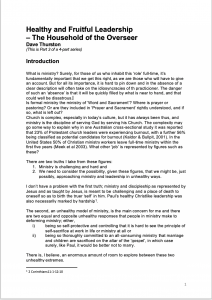Healthy and Fruitful Leadership – The Household of the Overseer
Dave Thurston
PDF Download
(This is Part 3 of a 4-part series)
Introduction
What is ministry? Surely, for those of us who inhabit this ‘role’ full-time, it’s fundamentally important that we get this right, as we are those who will have to give an account. But for all its importance, it is hard to pin down and in the absence of a clear description will often take on the idiosyncracies of th practicioner. The danger of such an ‘absence’ is that it will be quickly filled by what is near to hand, and that could well be disastrous.
Is formal ministry the ministry of ‘Word and Sacrament’? Where is prayer or pastoring? Or are they included in ‘Prayer and Sacrament’ rightly understood, and if so, what is left out?
Church is complex, especially in today’s culture, but it has always been thus, and ministry is the discipline of serving God by serving his Church. The complexity may go some way to explain why in one Australian cross-sectional study it was reported that 23% of Protestant church leaders were experiencing burnout, with a further 56% being classified as potential candidates for burnout (Kaldor & Bullpit, 2001). In the United States 50% of Christian ministry workers leave full-time ministry within the first five years (Meek et al 2003). What other ‘job’ is represented by figures such as these?
There are two truths I take from these figures:
1. Ministry is challenging and hard and
2. We need to consider the possibility, given these figures, that we might be, just possibly, approaching ministry and leadership in unhealthy ways.
I don’t have a problem with the first truth; ministry and discipleship as represented by Jesus and as taught by Jesus, is meant to be challenging and a place of death to oneself so as to birth the truer ‘self’ in him. Paul’s healthy Christlike leadership was also necessarily marked by hardship .
The second, an unhealthy model of ministry, is the main concern for me and there are two equal and opposite unhealthy responses that people in ministry make to deforming ministry; either,
i) being so self-protective and controlling that it is hard to see the principle of self-sacrifice at work in life or ministry at all or
ii) being so thoroughly committed to an all-consuming ministry that marriage and children are sacrificed on the altar of the ‘gospel’, in which case surely, like Paul, it would be better not to marry.
There is, I believe, an enormous amount of room to explore between these two unhealthy extremes.
In this third paper I will limit myself to the small but significant phrase in 1 Timothy 3: 4 ‘his own household’, that is, the overseer’s own household:
He must manage (rule) his own household well … (if anyone does not know how to manage (rule) his own household, how can he take care of God’s church?)
My plan is to look at the descriptions of first century households in the New Testament particularly from Ephesians and Colossians before exploring the description of just such a household, that of Priscilla and Aquila.
The First Century Household
When we look at the households of the NT it is evident that they are more complex and complicated than the nuclear family of our 21st century.
The passages in Ephesians and Colossians describe basic households as composed of husbands and wives, but also children and slaves. They would certainly have included, the widowed or never married members of the extended family as well as freed men and women. A first century household may well have had a business attached.
Paul’s instructions are similar and different in significant ways to the normal instructions to households in the ancient world. At one level, the basic structure of obligation of respect/obedience is the same; the significant difference is that the husband, father/parent, slave owner is accountable to the Lord. Once, again the idea of ‘rule’ (προϊστάμενον) is undergoing significant qualification. Husbands, fathers and slave owners do not use their position for their own advantage but for the sake of the person who is accountable to them, without causing them frustration or abuse.
Priscilla and Aquilla’s Household
Priscilla and Aquila were reasonably wealthy; expelled from Rome, they moved to the Roman colony of Corinth with sufficient of their household to set up their tent-making business there and offer Paul accommodation and employment until he received support from the Macedonian churches. I believe Pricilla and Aquila were so committed to Christ that Paul enlisted them to transfer their base of operations again to Ephesus in preparation for his three-year ministry there after his fourth visit to Jerusalem.
Romans 16 has an extensive list of people he wants the church in Rome to welcome and the first on the list are Priscilla and Aquila, and their household church:
3 Greet Priscilla and Aquila, my fellow workers in Christ Jesus. 4 They risked their lives for me. Not only I but all the churches of the Gentiles are grateful to them.
5 Greet also the church that meets at their house.
A healthy fruitful Christian household in the first-century was a complex unity that required order and unity, resources such as food and money, and services such as care of the sick, infirmed and bereaved, so that it might be a place of love and grace.
We need to see a vital connection between the person who is able, through the gift of salvation of Christ and his Spirit, to bring their ‘self’’ (a complex unity) under the rule of Christ, and their household under his rule as well. This repetition of kingdom order, from individual to household to church, is what lies behind Paul’s extraordinary statement in Philippians:
12 Therefore, my dear friends, as you have always obeyed – not only in my presence, but now much more in my absence – continue to work out your salvation with fear and trembling, 13 for it is God who works in you to will and to act in order to fulfil his good purpose.
Philippians 2:12-13
Does Paul’s own ministry in the church work itself out in household categories? I believe it does. The best example is in 1 Thessalonians 2.
Household Language in 1 Thessalonians 2
7 Instead, we were like young children among you.
Just as a nursing mother cares for her children, 8 so we cared for you. Because we loved you so much, we were delighted to share with you not only the gospel of God but our lives as well. 9 Surely you remember, brothers and sisters, our toil and hardship; we worked night and day in order not to be a burden to anyone while we preached the gospel of God to you. 10 You are witnesses, and so is God, of how holy, righteous and blameless we were among you who believed. 11 For you know that we dealt with each of you as a father deals with his own children, 12 encouraging, comforting and urging you to live lives worthy of God, who calls you into his kingdom and glory.
1 Thessalonians 2:7-12
All of Paul’s mixed metaphors describing his ministry with Silas and Timothy to the Thessalonians, have one thing in common, the language of households: they are in some ways like young children, in other ways like a nursing mother sharing the gospel and themselves, they are brothers and sisters, they were collectively like a father encouraging, comforting and urging to live lives worthy of God. One suspects that such a life at least in part would include the broad characteristics of 1 Timothy 3:1-7.
The requirement that an overseer should – rule, manage, care for his household well would, I believe, have included the ability to organise, direct and plan. The household was a complex reality that needed thought, attention, distribution of resources and the care of its separate parts so that there was a common health. So, I am seeing that the growing leaders we need for the church, should not only be gifted in preaching but also in helping a community thrive.
There are two implications that follow this exploration of the qualification of an overseer being able to rule, manage and care for his household well, and so be able to care for the church of God:
The Language and Posture of Leadership in the Household of God and
The Household-like Competencies of Church Leadership.
The Language and Posture of Leadership in the Household of God
It seems to me that the entire Bible is cautious in describing leadership, which has led some to assume that it is or at least should be a foreign concept among the people of God. A better way of describing the tension, is that the Old and New Testament descriptors are always seeking to subvert or at least qualify leadership. For example, kingship requires prophets who will remind them that the LORD is truly king. In the New Testament this reaches new heights (or is it depths) when the one,
6 who, being in very nature God,
did not consider equality with God something to be used to his own advantage;
7 rather, he made himself nothing
by taking the very nature of a servant,
being made in human likeness.
8 And being found in appearance as a man,
he humbled himself
by becoming obedient to death –
even death on a cross! (Philippians 2:6-8)
Jesus took enormous pains to underline that the type of leadership he modelled, embodied and espoused was servant leadership, and given who he is, it makes these statements even more breath-taking.
Jesus in his ministry warned against the use of positional titles:
8 ‘But you are not to be called “Rabbi”, for you have one Teacher, and you are all brothers. 9 And do not call anyone on earth “father”, for you have one Father, and he is in heaven. 10 Nor are you to be called instructors, for you have one Instructor, the Messiah. 11 The greatest among you will be your servant. 12 For those who exalt themselves will be humbled, and those who humble themselves will be exalted.(Matthew 23:8-12)
‘The minister’, ‘Reverend’, ‘Senior Pastor’ are bad enough, but more recently, pastors deport themselves as ‘the boss’ or ‘CEO’. These are power titles and as such, go against the very grain of gospel ministry. Of course, any title, even the preferred humiliating first century descriptor of Paul’s, slave (doulos) of Christ, can be used in such a way as to promote self, rather than promote others, but there are some titles that we must not use, especially as Presbyterians, where ministry is built constitutionally on the principle of little or no power, but much influence.
Leadership, in the Presbyterian denomination, whether it be of the minister or anyone else, is all about competent service first to Christ our Lord and then his to people .
The Household-like Competencies of Church Leadership
I believe ministers are not trained in the Household-like competencies of Church leadership. The Peter Principle states that people in a hierarchy tend to rise to their “level of incompetence”; an employee is promoted based on their success at previous levels until they finaly reach a level at which they are no longer competent, as skills in one level do not necessarily translate to a higher one.
I believe it is possible that good preachers can grow a church to a size that they, by themselves by virtue of no training are incompetent to ‘rule, manage and care for’ .
It may be that someone might say that that is why we have elders, but I would say that our elders are normally chosen not on the basis of household-like competencies and so often only further contribute to the problem. Or have competencies of the workplace and fail to understand the nuances of church and denominational structures.
I believe as a convinced Presbyterian leader, that leadership should be plural and diverse but it must be trained and equipped; mere theological ‘shibboleths’ and a B.Th. don’t bring health and fruitfulness to the complex human and divine creation know as church.
So, what are these household-like competencies? This list is by no means definitive, but here are some of my suggestions:
i. A model of leadership that is Christ-like; one that uses influence rather than power.
ii. An understanding of the need to bring people together under the call of Christ rather than loyalty to themselves.
iii. A commitment to dying to the old self and embracing the new self, created in Christ. (Self-awareness and self-regulation.)
iv. An understanding of the nature and workings of different size groups. Eg a church of fifty functions differently to a group of one hundred and twenty.
v. An understanding of the needs and challenges of different groups within a church.
vi. Being ‘comfortable’ and competent with handling conflict, both big and small.
vii. The ability to train and delegate.
viii. The ability to analyse complex systems for health and wholeness.
I am loathed to lay the lack of training and competency at the door of our theological colleges. What we need to understand is that the primary job they do is develop an understanding of how to read the scriptures, do theology and to a lesser extent, how to impart that knowledge. Skills and competencies are not honed in the classroom but in real life situations. These household-like competencies need to be part of the life of our churches, consciously and constantly taught, embodied and applied by pastors, elders, and ministry leaders.
This is the task of culture building that is the subject of the next paper.
Healthy & Fruitful Leadership (Part Three) – PDF Download

Healthy & Fruitful Leadership – Part One

Healthy & Fruitful Leadership – Part Two

Healthy & Fruitful Leadership – Part Four


